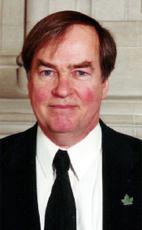Mr. Speaker, it is a privilege to represent the people of Hamilton-Wentworth both in the House and in this debate. I must say too, as this is my maiden speech, that it is somewhat daunting to follow such eloquence as we have heard here for most of the day.
I would like to convey to you, Mr. Speaker, and hon. members an anecdote that pertains to the debate we have heard in the House. I come from the village of Lynden, a rural community of some 500 in southern Ontario, which has always managed to send some of its sons and daughters to the great wars of this century.
On the wall as one enters the village church there is a roll of honour commemorating those who died in the service of their country. The village also has a branch of the Royal Canadian Legion which over the years has served, especially on November 11, to keep alive the memory of those who were willing to defend their lives, not just for Canada but for what Canada stands for.
Shortly before Christmas I attended a social at the legion centred on the giving out of service pins. The event was well attended for the branch is well supported in the community. What was unusual however was to see someone there who was actually on active service, to see the green uniform of today's Canadian forces. It was a young man in his early twenties named Chris Kivell. I talked to Chris whom I have known since he was a little boy. He had just been accepted into the Canadian forces, into the artillery. He was following in the footsteps of his grandfather, Owen Kivell, who had served in the navy during the second world war. Owen had survived the torpedoing of a ship in the north Atlantic. Young Chris looked very fine in his new uniform which he wore with pride.
Nevertheless I asked if he was not scared about the prospect of being sent to a hot spot like Bosnia and he said that he was. He had talked to other young men who had been there and who had recited the frustrations and dangers. Then he said to me suddenly, perhaps remembering that I was an MP: "But, Mr. Bryden, don't let them pull the Canadian troops out of Bosnia. We want to be there". I have since had time to reflect on his comment. A whole generation separates us so I cannot be sure that I am reading his feelings accurately. However I know my village. I know the people in it. I know the values he grew up with.
My conclusion is that Canada has a fine military tradition both francophone and anglophone going right back to the French and British struggles of the 18th century. In the 20th century in the Boer War, the Great War and World War II, Canadian soldiers both French and English speaking incurred the admiration even of their enemies for their bravery and devotion at Dieppe, at Normandy and during the liberation of Europe.
In the post-war years the Canadian forces became specialists at peacekeeping. Again our Canadian soldiers garnered the admiration of the world for their firmness, their bravery and their non-partisan ability to keep warring parties apart. The book perhaps has yet to be written that fully describes their accomplishments but the world knows. Canada and peacekeeping: that is the legacy that has been created by Canada's soldiers over the past 40 years.
Now the world is a darker and more threatening place. The breakup of federated nations like the former Soviet Union and former Yugoslavia has unleashed hatreds that go back centuries. Peacekeeping as we used to know it is all but impossible in these terrible tribal conflicts. The hate runs deep and it has no respect for women and children.
Our soldiers in Bosnia are there for humanitarian reasons only. At the risk of their lives they are there to guarantee that people be fed. The UN intervention has saved hundreds of thousands from starvation. Canada is an essential part of that intervention. Canadian soldiers have died in Bosnia. Others have been injured but thousands of people, mainly women, children and the elderly, have been saved.
I submit that the international role of Canada's military has advanced rather than regressed, advanced at least in spirit. Instead of fighting to win wars and instead of fighting to prevent wars now in Bosnia we are simply fighting to save lives. Is there a nobler purpose for a soldier? I think not.
I look across the floor in the direction of members of Bloc and Reform. I was most impressed by the compassionate content of their remarks during the debate. Their comments reveal that no matter what separates us in ideology, no matter what separates us in history going back to Lord Durham's report or to the Plains of Abraham, we are united in our desire as Canadians. Call us what us what you will, Saskatchewaners, BCers, Acadians or Quebecers, we are united in our desire to rescue those in the world who are defenceless, those who are hurt and hungry.
Let us not be deflected from doing what is right because of opinion polls. The trouble with always doing what a majority seems to want is that majorities can sometimes be poorly informed. There is no regular news coverage of the Canadian forces in Bosnia. Their story is not being told by the Canadian media. We cannot judge the Canadian situation in Bosnia by watching CNN or reading a newspaper. We must therefore take guidance from the only people who really know, who are right on the spot: our own soldiers, the Vandoos and the Princess Pats for instance. They believe in what they are doing. We on all sides of the House should be very proud of them.

